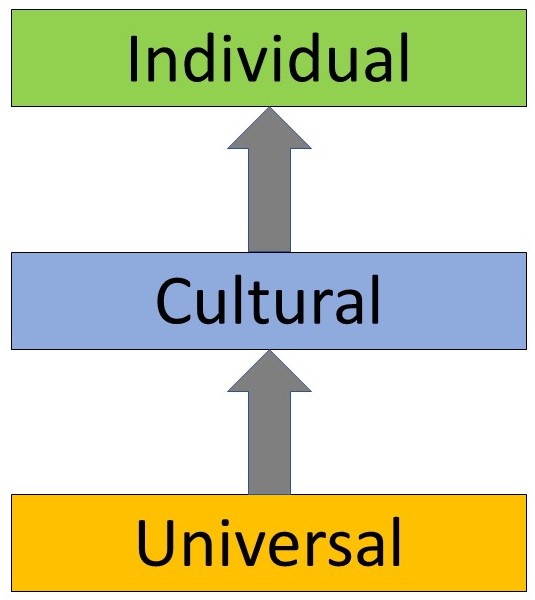All culture is local.
You hear that sentiment sometimes in a discussion about cultural norms, customs, or values, especially when an outsider implies any criticism. On its face, the expression may be true. The problem is the subtext. Often, it’s a way to forbid any critique of a culture from the outside.
 The cultural is the arena between the individual and the universal, as the graphic shows. If the universal is that which applies to all persons, and the individual that which applies to one person, the cultural is that which applies to some and not others. Often, the some are “those around here” and the others “those somewhere else.”
The cultural is the arena between the individual and the universal, as the graphic shows. If the universal is that which applies to all persons, and the individual that which applies to one person, the cultural is that which applies to some and not others. Often, the some are “those around here” and the others “those somewhere else.”
Yes, culture is largely local. I grew up enjoying black-eyed peas and cornbread. After moving to another state, I learned that such fare was alien. But cultural artifacts such as favorite foods are mostly neutral. (With some exceptions. Someone described a favorite food in an Asian nation: live baby mice dipped in butter. This surely could not be considered simply an acquired taste or neutral local favorite.)
What is more significant for a society is how a culture exercises its worship. Culture has everything to do with worship. The word “culture,” in fact, derives from “cult.” George Grant, in The Micah Mandate, points out that “according to Augustine, culture is … an outworking of a people’s creed … the temporal manifestation of a people’s faith.”
Postmodernism at work
But to say that all x (culture, politics, et al) is local can be just another expression of the postmodern lie that denies universal truth (except of course for certain universal truths such as all culture is local.) Today we are hearing that “all x is local because you don’t know my situation. My community lies outside the scope of any objective standard of behavior or values.”
In fact, we are seeing this taken to the level of the individual: “My identity is self-determined. You have nothing to say to me about whatever I want to affirm about myself.” In some contexts—particular college campuses, for example—this notion has been promulgated to a remarkable point: some students can’t bring themselves to acknowledge what is perfectly obvious. Maybe it’s time to resurrect Hans Christian Anderson’s “The Emperor’s New Clothes.”
 When people use the argument that all culture is local to reject outside critique, we are seeing the logical extension of postmodernism, the disappearance of objectivity and external authority. Nothing can be affirmed as true for everyone, so no universal authority can be acknowledged or tolerated. All culture is local, and that’s the end of the argument!
When people use the argument that all culture is local to reject outside critique, we are seeing the logical extension of postmodernism, the disappearance of objectivity and external authority. Nothing can be affirmed as true for everyone, so no universal authority can be acknowledged or tolerated. All culture is local, and that’s the end of the argument!
A society cannot sustain this kind of narrow, self-centered thinking. Noah Webster, author of Webster’s 1828 Dictionary and Father of American Education said as much, as Elizabeth Youmans pointed out in The Role of the Bible in Early American Education.
When you become entitled to exercise the right of voting for public officers, let it be impressed on your mind that God commands you to choose for rulers, ‘just men who will rule in the fear of God.’ The preservation of [our] government depends on the faithful discharge of this Duty; if the citizens neglect their Duty and place unprincipled men in office, the government will soon be corrupted; laws will be made, not for the public good so much as for selfish or local purposes; corrupt or incompetent men will be appointed to execute the Laws; the public revenues will be squandered on unworthy men; and the rights of the citizen will be violated or disregarded.[vi] (emphasis added)
Webster alludes to 2 Samuel 23:3 (see also Exo. 18:1 and Deu. 16:18). He warns against allowing “selfish or local purposes” (another way to say “individual” and “cultural”) to circumvent scriptural universals. He’s writing about elections, but the standard applies in any arena. If local culture and individual experience are immune from critique, the Bible has nothing to say to either. These twin doctrines of sacred individual experience and absolute cultural relevance strip the gospel of its authority, making it subservient to the preferences of individuals and customs of communities. Isaiah may have had this perversion in view when he wrote,
Woe to those who call evil good and good evil, who put darkness for light and light for darkness, who put bitter for sweet and sweet for bitter! Woe to those who are wise in their own eyes, and shrewd in their own sight! Isa 5:20-21 ESV
All culture is local – a northern example
Here’s an actual case of the doctrine of cultural relevance trumping the authority of the Bible.
God made all creatures. While a moose is not made in the image of God, he is a creature made by God to be treated with respect. Both a biblically faithful Christian, and an animist will treat animals well, but for different reasons.
In an animistic culture that practices subsistence hunting, you are free to kill animals for food, but you must be careful to revere the animal, not to offend its spirit by being disrespectful. If you speak openly of your plans to hunt, you will alert the spirit of the animal and likely be foiled.
Nor must you ever brag after a successful hunt. In one incident a hunter boasted of shooting a moose lying down: “I shot that moose before he was able to stand up!” A few days later he was in the woods and narrowly escaped a charging moose, climbing a tree just in time. What was happening here? The spirit of the moose heard his boasting and tried to kill him. His story confirmed what every local believed: never be disrespectful to the moose.
And as I learned, any outsider inclined to challenge this view of things violates the all culture is local doctrine. Even among Christ followers.
The animist spiritualizes animals while the West mechanizes animals. Think of industrialized chicken production or egg production. The West objectifies animals as producers of meat, eggs, etc. We treat animals like machines, not like the creatures they are.
The truth lies between animism and materialism. In the Narnia Chronicles, C.S Lewis depicts talking beasts, creatures higher than dumb animals and lower than humans.
Why do we have the Bible?
So what is the Bible? A collection of Sunday School stories? A regional handbook for Ancient Near East communities? A source of spiritual truth mostly irrelevant to daily life? No, no, and no. Does the Bible have anything to say to the animist moose hunter? Yes, in at least two dimensions: humans have dominion over the creation, and God does not share His Lordship with the spirits of nature.
As to human dominion,
Genesis 1:28, And God said to them, “Be fruitful and multiply and fill the earth and subdue it, and have dominion over the fish of the sea and over the birds of the heavens and over every living thing that moves on the earth.”
Genesis 9:1-3, And God blessed Noah and his sons and said to them, “Be fruitful and multiply, and fill the earth. And the fear of you and the terror of you shall be on every beast of the earth and on every bird of the sky; with everything that creeps on the ground, and all the fish of the sea, into your hand they are given. Every moving thing that is alive shall be food for you; I give all to you, as I gave the green plant.”
Psalm 8:5-8, Yet you have made him a little lower than the heavenly beings and crowned him with glory and honor. You have given him dominion over the works of your hands; you have put all things under his feet, all sheep and oxen, and also the beasts of the field, the birds of the heavens, and the fish of the sea, whatever passes along the paths of the seas.
As to God as Lord over all things,
1 Corinthians 8:6, Yet for us there is but one God, the Father, from whom are all things, and we exist for Him; and one Lord, Jesus Christ, by whom are all things, and we exist through Him.
Acts 14:15, Men, why are you doing these things? We are also men of the same nature as you, and preach the gospel to you in order that you should turn from these vain things to a living God, who made the heaven and the earth and the sea, and all that is in them.
Deuteronomy 32:39, See now that I, I am He, And there is no god besides Me; It is I who put to death and give life. I have wounded, and it is I who heal; And there is no one who can deliver from My hand.
1 Kings 8:60, So that all the peoples of the earth may know that the LORD is God; there is no one else.
Romans 1:25, For they exchanged the truth of God for a lie, and worshiped and served the creature rather than the Creator, who is blessed forever. Amen.
Maybe all culture is local, maybe individual experience is unique. But every culture is subject to the scrutiny of the Word of God, and every individual will bow the knee to Jesus Christ. “No creature is hidden from his sight, but all are naked and exposed to the eyes of him to whom we must give account,” (Heb 4:13 ESV).
- Gary Brumbelow with Darrow Miller






